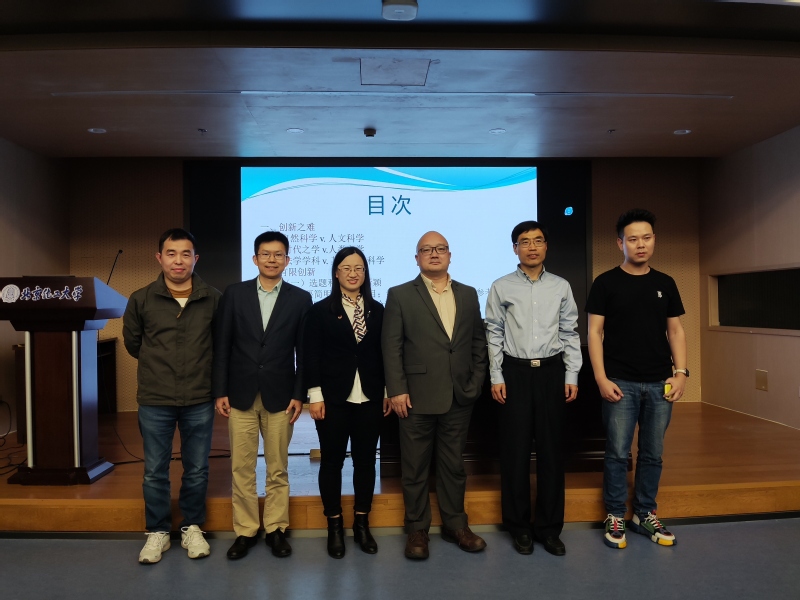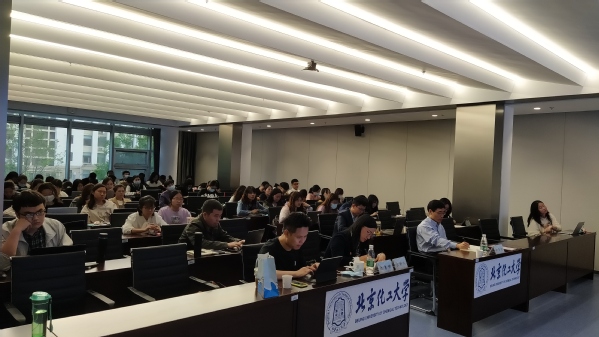College of Humanities and Law Holds the 7th Session of Renowned Jurists Seminar,

On the evening of April 23, 2021, the Seventh Session of Renowned Jurists Seminar, entitled Chemical Education Forum, was held in the Second-floor Lecture Hall of the Conference Center on East Campus. The seminar was organised by College of Humanities and Law and hosted by the Postgraduate Student Union of the College.
Tu Yongqian, research fellow at National Institute of Development and Strategy and School of Labor and Human Resources, Renmin University of China, was invited to be the keynote speaker at this session. Professor He Yudong, discipline leader of law at BUCT, attended the seminar. Professor Zhao Huimiao presided over the seminar, with some members of teaching staff of law and more than 100 postgraduate students participating in it.
In his speech themed “Innovations in Jurisprudential Study”, Prof. Tu expressed his concern about some of the problems law study had been facing. He believed that given the difficulty in terms of innovation, students of law need to learn how to think creatively and critically on the basis of extensive literature study. The science of law is one that should answer the call of the times, where new formulations and political concepts are bound to spring up. Consequently, researchers can never make any progress behind the closed doors. At the same time, the science of law is no isolated island. Law studies should be conducted by breaking the barriers between disciplines, which indicates that interdisciplinary methodology is a new direction for future jurisprudential study.
Prof. Tu then took his studies as examples to illustrate the importance of cross-discipline approaches. The cited findings include the incentive plans by combining Labour Standards Law and Economics, and Quantitative research on mental damage compensation based on studies in the fields of Tort Liability Law, psychology as well as natural science. These cutting-edge findings are all good examples of novelty in his interdisciplinary research.
Prof. Tu also addressed the spirit of innovation in writing academic papers. He emphasized that innovativeness could be reflected in such early stages as selecting the topic and determining the thesis conception. It could also be exhibited in the conciseness of the title and the accuracy of key words. He mentioned that the need for innovations in jurisprudential study required that law researchers approach law issues comprehensively and broadly, adopting various perspectives and cross-discipline methodologies. Only by extensive studies and investigations can law researchers find problems and try to solve them.

The hostess, Professor Zhao Huimiao, talked about her feelings about this lecture: the innovation of legal research should be problem-centered, and legal research requires critical thinking. Meanwhile, reality should be focused on; legal theory learning should be based on the reality of China and knowledge should be acquired through transfer rather than transport. In the interaction session, Associate Professor Yu Jun from the School of Arts and Law summarized this lecture with three characteristics: novelty, creativity and practicality.According to him, importance should be attached to research and innovation, and a multi-disciplinary perspective and a systematic way of thinking need to be adopted, thinking beyond the legal perspective. The current legal research fails to grasp the macro to some extent, and merely studies some subtle issues. Professor Tu's speech provides a new direction for our research and proves an inspiration to our insights. Shao Yi, a teacher from the Faculty of Law and some graduate students had further communication with researcher Tu Yongqian on the evaluation criteria and keyword extraction in legal research respectively. Professor He Yudong made a concluding speech, pointing out that innovation is difficult, and legal innovation is even more difficult. It is even more challenging to present legal innovation in such a way. He also emphasized the innovativeness and importance of researcher Tu Yongqian's quantitative research on mental damage. After the lecture, Professor He issued a commemorative certificate to Researcher Tu Yongqian.

Brief introduction of the speaker:
Professor Tu Yongqian, Doctor of Laws of China University of Political Science and Law, Postdoctoral of Laws of Renmin University of China, Postdoctoral of Applied Economics of Xi'an Jiaotong University, Senior Visiting Scholar of University of Denver, National Think Tank---Researcher of National Institute of Development and Strategy of Renmin University of China, Distinguished Young Scholar of Renmin University of China (post A); his research field is extensive, including economic regulation law, labor employment legal system and labor relationship management, food safety rule of law and other interdisciplinary fields involving law, economics, management, sociology and psychology.
Professor Tu Yongqian has published more than 120 academic papers and review articles in national newspapers and media such as Social Sciences in China and China Legal Science, composed more than 50 online articles or media interviews; published 12 monographs and translations; presided over a number of provincial and ministerial projects.
Contributor: Zhao Huimiao, Wu Yazhou

